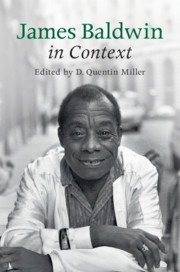Book contents
- James Baldwin in Context
- James Baldwin in Context
- Copyright page
- Contents
- Contributors
- Introduction: James Baldwin in Context
- Part 1 Life and Afterlife
- Part 2 Social and Cultural Contexts
- Chapter 12 Intersectionality
- Chapter 13 Baldwin and the Early Civil Rights Movement
- Chapter 14 Segregation and the South
- Chapter 15 The Assassinations: Medgar, Malcolm, and Martin
- Chapter 16 Gospel
- Chapter 17 “The Whole Body of the Sound”: The Black Musical Basis of Baldwin’s Literary Craft and Social Vision
- Chapter 18 Baldwin and Psychoanalysis
- Part 3 Literary Contexts
- Index
Chapter 18 - Baldwin and Psychoanalysis
from Part 2 - Social and Cultural Contexts
Published online by Cambridge University Press: 12 July 2019
- James Baldwin in Context
- James Baldwin in Context
- Copyright page
- Contents
- Contributors
- Introduction: James Baldwin in Context
- Part 1 Life and Afterlife
- Part 2 Social and Cultural Contexts
- Chapter 12 Intersectionality
- Chapter 13 Baldwin and the Early Civil Rights Movement
- Chapter 14 Segregation and the South
- Chapter 15 The Assassinations: Medgar, Malcolm, and Martin
- Chapter 16 Gospel
- Chapter 17 “The Whole Body of the Sound”: The Black Musical Basis of Baldwin’s Literary Craft and Social Vision
- Chapter 18 Baldwin and Psychoanalysis
- Part 3 Literary Contexts
- Index
Summary
James Baldwin repeatedly describes modern life in terms of repressed desires, anxious projections, and tortuous ambivalences – pitiful and destructive pathologies that determine interracial contact in the United States. In a characteristic moment in The Fire Next Time (1963), for example, he traces the intensifying hostilities that will soon lead to a series of assassinations of his friends and colleagues – beginning with the murder of Medgar Evers in June of the same year – to the unprocessed psychosocial contradictions in which “whiteness” is grounded: “a vast amount of the energy that goes into what we call the Negro problem,” he writes, “is produced by the white man’s profound desire not to be judged by those who are not white, not to be seen as he is, and at the same time a vast amount of white anguish is rooted in the white man’s equally profound need to be seen as he is, to be released from the tyranny of his mirror.” Because of the series of unprocessed ethical catastrophes that mark the history of diasporic modernity, everyday life in twentieth-century United States is governed by something like a narcissistic syndrome in which the subject is bound to his inverse mirror image, one that he loves and hates with an unacknowledged passion. Much like a trompe-l’oeil tableau, this idealized imago coincides with a deadly doppelgänger, the harbinger of one’s annihilation. The “race problem” is but a symptom of such narcissistic ambivalence. “These tensions,” as Baldwin continues, “are rooted in the very same depths from which love springs, or murder. The white man’s unadmitted – and apparently, to him, unspeakable – private fears and longings are projected onto the Negro.” The mirror dialectic is originally a way for the “white” subject to avoid acknowledging – paying the price for – the collective past; in The Fire Next Time, Baldwin criticizes the Nation of Islam for eagerly participating in the game in which one reproduces the self by murderously desiring his specular other.
- Type
- Chapter
- Information
- James Baldwin in Context , pp. 187 - 198Publisher: Cambridge University PressPrint publication year: 2019



